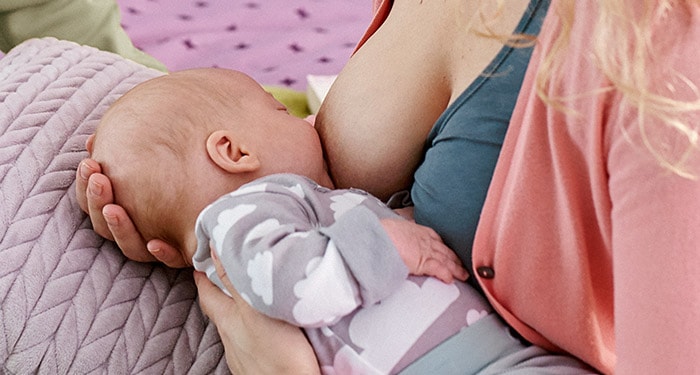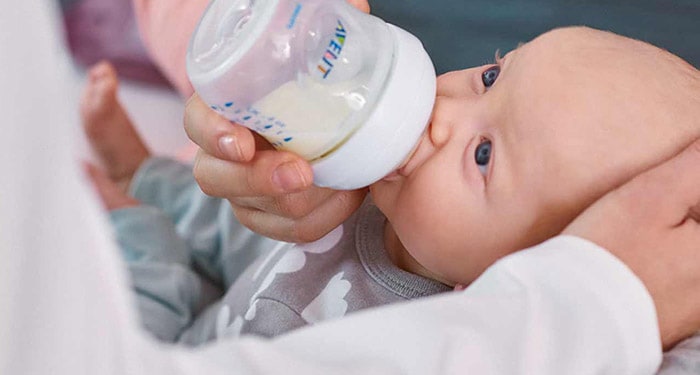Every breastfeeding journey is unique and beautiful, but it’s not always easy for every new mother. Philips Avent is committed to
Breast milk provides babies with all the nutrients needed for a healthy start in life. Breastfeeding is highly beneficial for mothers and babies. All the nutrients necessary for healthy infant growth and development are present in breast milk. Children who are breastfed for longer have less chronic health issues, lower infection, fewer dental malocclusions, and higher intelligence than those who are breastfed for shorter periods, or not breastfed2. In fact, the World Health Organization recommends exclusive breastfeeding up to 6 months of age3. But this very natural act does not come easily to every new mother. Stress, embarrassment, and lack of knowledge are all impediments to successful breastfeeding. So it’s important that parents feel comfortable turning to you for expert advice. As a healthcare professional, you can provide parents with critical support, guiding them to the feeding solution best suited to them – one that will give their baby the best start in life. As a healthcare professional, you can provide parents with critical support, guiding them to the feeding solution best suited to them – one that will give their baby the best start in life.
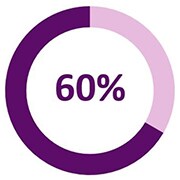
Up to 60% of women who breastfeed stop earlier than they want to1.
World Breastfeeding Week 2019 campaign materials
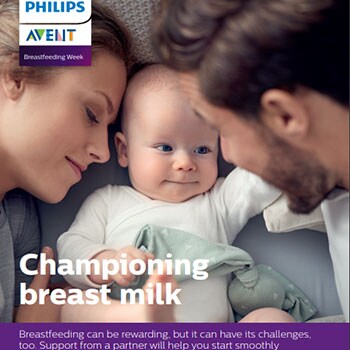
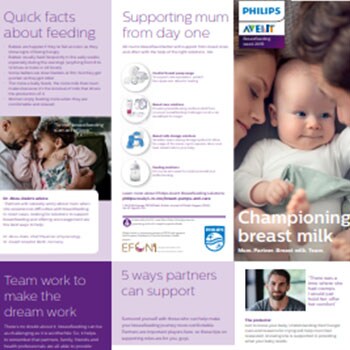
Supporting successful breastfeeding
Our range supports mums and babies from one feed to the next—from initiating breast milk to protecting and maintaining a supply.
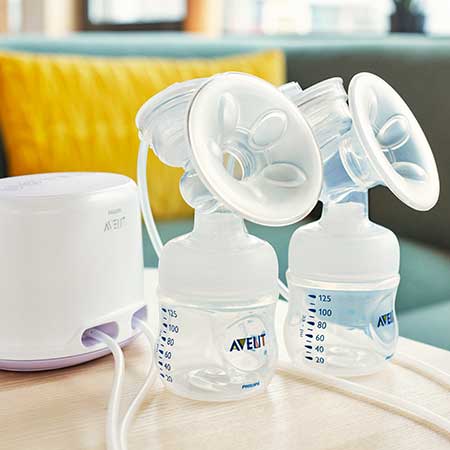
Breast pumps Clinically proven comfort4-7, designed for discreet milk expression. Enabling mums to express enough milk in one session for one feed4.
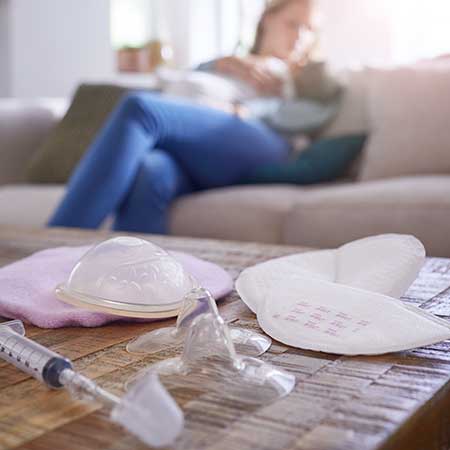
Breast care Providing breastfeeding mothers relief from breastfeeding challenges, Philips Avent has an extensive breast care accessories range to support mother to breastfeed for longer.
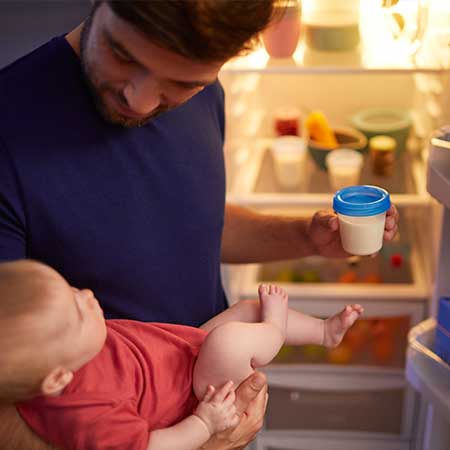
Breast milk storage This versatile, space saving storage system allows a nursing mother to use the same cup to express, store, and feed breast milk to her baby. The cups are ideal for storing food both at home and away.

Supporting a healthy start in baby’s life
This year’s Philips Avent campaign “Championing breastmilk” is all about raising awareness towards the important role that partners can play in the breastfeeding journey as well as encouraging such involvement for a better start in the newborn’s life. Recent research done by Philips Avent has found that 76% of the surveyed mothers think that more information is needed on how partners can support the breastfeeding journey. Moreover, the study finds that even though partners are thoroughly involved in most aspects of this process, mothers believe that more support is needed in the areas of cleaning the breast pumps and bottles for next feeding as well as researching on how to feed the baby. Empowering and educating partners on the benefits of breastfeeding, has long-lasting benefits for the baby and involvement of partners in this process could double the likelihood of the baby being exclusively breastfed until 6 months of life. [1] There are posters available with tips for both mothers and partners on the benefits of breastfeeding and on the importance of supporting mothers in this journey.
Parent support materials
Philips Avent breastfeeding posters and parent brochures are available here to download and print. Take advantage of these materials that emphasize the importance of early breastfeeding for new mothers.
Poster #1: Celebrating breastmilk
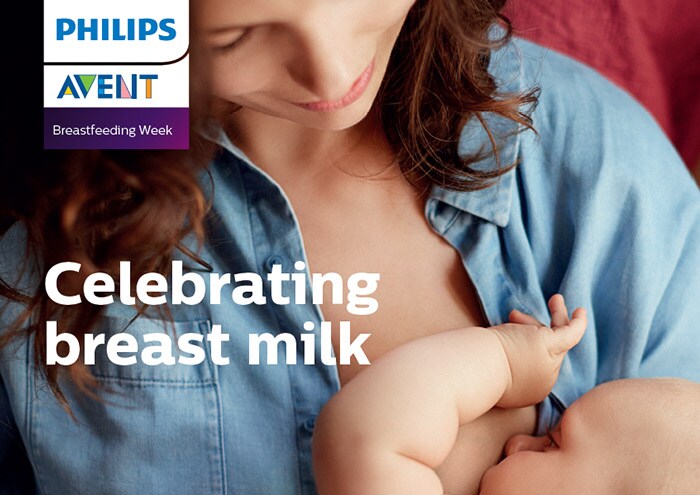
Poster #2: Prepare yourself for success
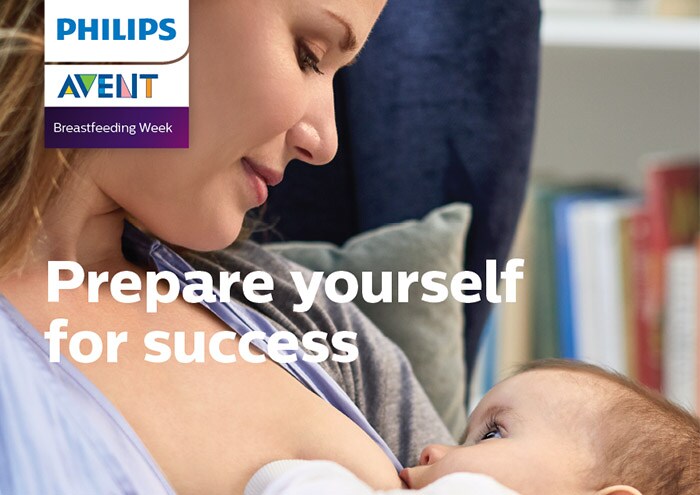
Parent brochure #1: Soothing sore nipples
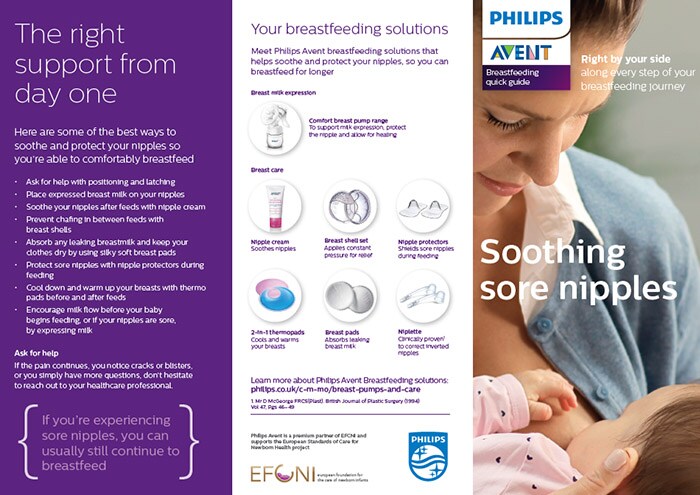
Parent brochure #2: Relieving engorgement
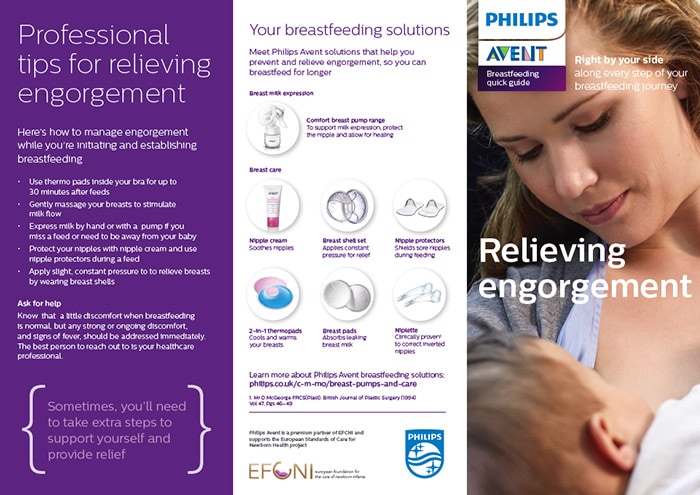
Opportunities for improved breastfeeding adherence
As a healthcare professional you are a nursing mother’s primary source for expertise on initiation, positioning, and routine. Some new mothers experience problems with infant sucking or latching on, which can cause pain or discomfort during breastfeeding; others believe that they do not produce enough milk; some encounter medical problems, or choose to return to work early1,8. When mothers and parents need help, you can help them find the best infant feeding solution. Key to success is the ability to relax. Milk volume and flow are closely linked to mother’s psychological wellbeing and stress levels10-12. In a study carried out by Philips Avent, mothers expressed significantly more milk after 10–15 minutes of doing a breathing exercise or listening to music13. In addition, a quiet location away from daily distractions or prying eyes can help. Today, many family-friendly venues provide dedicated spaces where a mother can breastfeed her baby or express milk in a calm relaxing environment.
Returning to work can be another barrier. Nearly one in five mothers in the United States8 and one in ten mothers in Europe1 stop breastfeeding upon returning to work. These mothers must be supported to find appropriate infant feeding solutions to help express milk during the workday. Mothers can ask for a dedicated place to breastfeed or express breast milk and may seek support from their healthcare professional in doing so. Educational materials to support infant feeding are available along with tips and instructions for proper lactation, expressing, and comfort. Your valued opinion can make a difference. Remember, women asking for support or having direct access to healthcare professionals are more likely to continue to breastfeed for a longer period of time8.
Educational videos for healthcare professionals
Take a look at the videos with Vicki Scott, midwife and breastfeeding advisor. The videos can help you to further support parents with breastfeeding.
Prepare for breastfeeding
Breastfeeding positions
Perfect latch and attach
Valuable breastfeeding resources for professionals

Relaxation study
Evaluating the effect of relaxation on milk expression with lactating mothers

Predictors of expressed breast milk volume in mothers expressing milk for their preterm infant
This study concludes: “In multivariate analyses, double pumping, early establishment of milk production and perceived comfort of the breast pump were the strongest predictors of milk production.”

Real-time 3D ultrasound imaging of infant tongue movements during breastfeeding
3D ultrasound scanning can be used to view an infant’s tongue movements. Study was conducted to better understand the physiology of breastfeeding and the relative importance of vacuum and peristalsis in milk extraction.
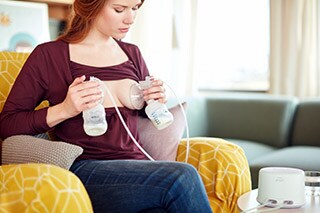
Many preterm infants are too weak to breastfeed, leading to reliance on expressed milk. This trial compares two double electric breast pumps and details the primary and secondary results.
References
1. Effectiveness of targeting fathers for breastfeeding promotion: systematic review and meta-analysis, 2018. 2. Victora CG, et al. Lancet 2016;387:475–490 3. World Health Organization, United Nations Children’s Fund. Global strategy for infant and young child feeding. http://www. who.int/nutrition/topics/global_strategy/en/. Published 2002. Accessed March 5, 2013 4. Fewtrell MS, Kennedy K, Lucas A,. Randomised trial comparing the efficacy and acceptability of the Philips Avent Comfort single electric breast pump and the Medela Swing single electric breast pump in mothers exclusively breastfeeding their healthy term infant: analysis of primary outcomes, March 2016. 5. Fewtrell M, Lucas P, Collier S, Lucas A. Randomized study comparing the efficacy of a novel manual breast pump with a mini-electric breast pump in mothers of term infants. J Hum Lact 17: 126-131, 2001. 6. Fewtrell MS, Lucas P, Collier S, Singhal A, Ahluwalia JS & Lucas A. Randomized trial comparing the efficacy of a novel manual breast pump with a standard electric breast pump in mothers who delivered preterm infants. Pediatrics 107: 1291-1297, 2001. 7. Burton PM, Kennedy K, Ahluwalia J, Nicholl R, Lucas A, Fewtrell M. Breast pump design and milk production: A randomised control trial. Poster presentation at the American Academy of Pediatrics National Conference & Exhibition, October 2010 birth 8. De Jager M, et al. Eur Obstet Gyn Suppl 2012:25–30. http://www.newscenter.philips.com/pwc_nc/main/shared/assets/es/Downloadablefile/breastfeeding/bareers_to_breastfeeding.pdf; accessed June 1, 2016 9. Li R., et al. Pediatrics 2008;12:S69–S76 10. Lau C. Pediatr Clin North Am 2001;48:221–234 11. Newton M, et al. J Pediatr 1948;33:698–704 12. Ueda T, et al. Obstet Gynecol 1994;84:259–262 13. Philips Avent Relaxation Study. Data on file.











